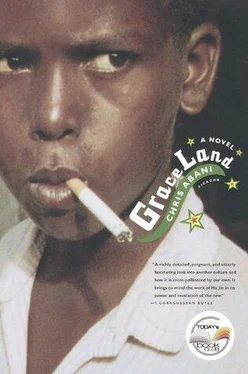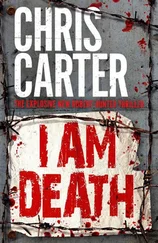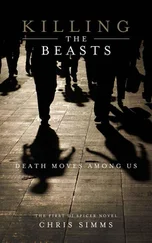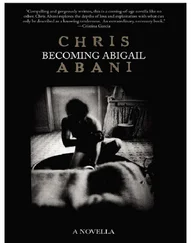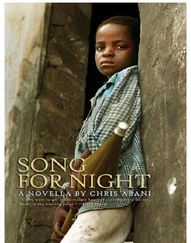Oye and Beatrice were out on the front veranda, Oye in a wicker chair that creaked and groaned with every breath she took, as though the weight of her were unbearable, and Beatrice lying on a raffia mat on the floor, a light blanket wrapped around her. Beside her, Oye had set a steaming mug of some herbal infusion. Beatrice was not quite sure what it was for or how Oye expected the herbs to achieve what chemotherapy hadn’t. She rubbed the sore scar tissue where her left breast had been, glad to be free of the prosthetic with its tightness and infernal itch.
It was late and the night was cool. Across from their compound, they could see lights bobbing about across the street as people just back from their farms prepared a late supper. It was an arduous life, complicated by the fact that they had all just emerged from a three-year civil war in which most families lost members vital to the rebuilding of their new lives. Women were missed more than men, because they made up the main work force. Beatrice was glad for the education that allowed her to earn her living as a primary-school teacher. Or used to, anyway, before she got sick.
A coconut shell of smoldering coals seemed to float by unassisted in the dark, the person carrying it lost in the deeper blackness.
“Remember when I had to carry coals from neighbors’ houses back to ours to light de hearth as a child?”
“Yes,” Oye replied. “You were so scared of tha fire,” she added with a chuckle.
“It was hot and dangerous.”
“I know, lass, but we couldn’t afford matches in those days.”
“I will miss dis place, Mama,” Beatrice said.
“Yes, lass. But we’ll call you back to be reborn into tha lineage again.”
“As a boy next time!”
“Why? They are such limited creatures.”
“But wanted.”
“I always wanted you.”
“I know, Mama. But remember de songs dat de women would sing when a boy was born? Ringing from hamlet to hamlet, dropped by one voice, picked up by another until it had circled de town. And de ring of white powder we would wear around de neck to signify de boy’s place as head of de family.”
“We sing for girls too.”
“Yes, Mama. A dirge. Mournful, carried by solo voices until all de town was alerted of de sadness of de family. And de ring of powder we wore was around de elbow to show the flexibility and willingness to work hard of de woman. When I come back, it will be as a boy. You know dat’s de only reason Sunday hasn’t taken another wife. Because I bore him a son.”
“Hush, lass, you need your strength, but tell your son tha things he should know.”
They didn’t speak for a while, the silence broken only by the call of wild dogs in hills far in the distance, the shrill of crickets, the throaty blues of frogs and Beatrice slurping the hot herbal infusion.
“Mama, do you think dere is something strange with Joseph and Efua’s relationship? Since his wife died he hasn’t been right. Why do all de wives die young in dis family?”
“Which question do you want me to answer, lass?”
“Never mind,” Beatrice said, as a shadowy figure approached, swinging a flashlight back and forth.
“Who’s tha’?” Oye called out, her hand reaching into the folds of her lappa for the knife she always carried there. Used mostly to cut herbs, its blade was a sharp enough warning to any mischief-maker.
“It is Joseph, Mama.”
“I’m not your ma,” Oye said.
“Good evening, Joseph,” Beatrice greeted him. Things were awkward between them since Joseph made a pass at her on her wedding night.
“Evening. Is Sunday home?”
“You know where he is. Since I became ill he lives at dat bar downtown.”
“So he’s at de bar?”
“Are you stupid, son?” Oye asked.
“Good night, ladies,” Joseph said, turning to leave.
Not long after Joseph left, Beatrice hauled herself up from the mat and headed inside.
“Good night, Mama.”
“You need to tell your son about tha sickness, Beatrice. You need to prepare him.”
“I am preparing him, Mama. I am teaching him things dat useless school cannot. I have taught him to sew, to iron, to cook, to read and to write at a level beyond his age.”
“Yes, lass. But it’s not enough.”
“Good night, Mama.”
“Good night, child. Be here in tha morning,” Oye replied.
When he woke from the nightmare Elvis stumbled out of bed and made his way sleepily to his mother’s room. His parents didn’t share a bedroom, though his father sometimes came to sleep in Beatrice’s room. Elvis guessed he had nightmares too, and judging from the sounds his mother made, he guessed his father’s nightmares transferred to her.
He could always tell when his father was in Beatrice’s room. His slippers, left outside the shut door, were a clear sign to stay away. When he saw them, Elvis would make his way to Oye’s room, which was outside the main house, next door to the kitchen. The short trip across the dark yard was terrifying, so he only went to Oye’s when he had to.
He opened his mother’s door and, in the dim glow from the storm lantern in the corner with its wick turned nearly off, felt his way to the bed. His fingers grazed the small blue Bible she kept on the nightstand. Next to it was her journal, bound in worked leather that smelled of things old and secret. He loved watching her write in it, and he would fetch it for her, inhaling the deep scent of it, thrilled that she trusted him not to look in it. And he never did. He lingered by the nightstand, touched the journal, rubbing his hand over the cracked leather binding.
Beatrice woke up to go to the bathroom. As she stood up, the lappa covering her slipped off, revealing her nudity. Before she could cover herself, Elvis saw the emptiness where her breast had been.
“Elvis! What are you doing here?”
“I had a bad dream, Mama.”
She saw the look of something nameless on his face.
“Come here,” she said.
He ambled over and stood in front of her. She sat down on the bed so they were the same height.
“Do you know what is happening to me?” she asked.
“Sure,” he replied. “You are ill. That’s what Oye says.”
“Granny to you!” she chided. “Yes, I am ill,” she continued. “I have cancer.”
“What’s that?” he asked.
“Dat’s when your body begins to fight you. So de doctor cuts away de angry part and hopefully you get well.”
“Was your breast fighting you?”
“Yes.”
“So now it has been cut away, are you better?”
“The doctor is not sure. It might have spread.”
“The anger?”
“Yes, de anger,” she replied.
“Why is your body angry with you?”
“I don’t know.”
“Will you still have any children?” he asked.
She laughed uncomfortably.
“Why do you ask dat?”
“Well, you’ll need your breast to feed them.”
“I still have one.”
They both laughed at this. Then, seeing that his attention was riveted on the rumpled scar tissue, not quite healed in parts, she took his hand.
“Would you like to touch it?”
“Will my body become angry too if I touch it?”
“No, silly.”
He nodded and she placed his hand over the torn flesh. He moved it up and down, intrigued by the texture. She closed her eyes against the tenderness; then gently she pulled his hand from her.
“Come, get in bed now and sleep,” she said.
“What do you mean, she doesn’t have a breast?” Efua asked.
“I swear to God. She doesn’t.”
They were lying in the shade of some mango trees that grew in a clump by the river. They could hear, further upstream, the sound of women talking as they fetched water and washed vegetables and roots for cooking; downstream from them, the squeals of children swimming and the shouted warnings from the adults in their separate bathing sections, the men closest to the children, the women round the bend, hidden by shrubs. A boy ran up the hill glistening like a fish, all sun and water. At the top, he yelled and ran downhill at speed, disappearing from view halfway down the slope. The sound of him cannonballing into the water carried up to them. Elvis and Efua loved it here: close enough to everyone to feel part of things, yet far enough away so that they could be alone. Efua looked back from the river and the antics of the children to Elvis. At ten, she was only three years older than he was, yet her eyes looked ancient. Oye often cautioned her about her closeness to Elvis. It is unnatural for cousins to be as close as they were, always together, Oye would tell her.
Читать дальше
